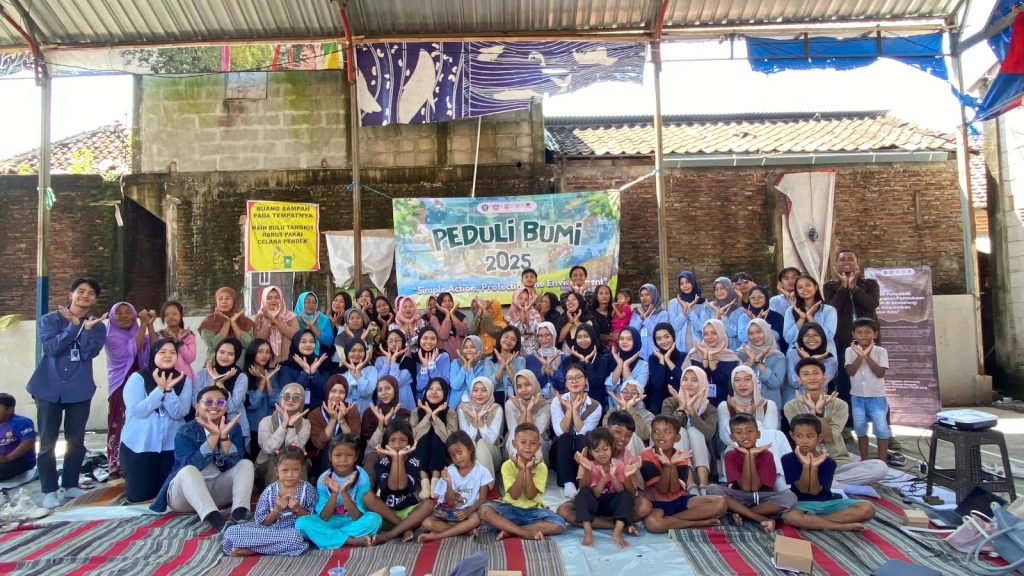Semarang, Jawa Tengah – Land subsidence in the city of Semarang occurs gradually each year and has resulted in various significant impacts. In the coastal areas of Semarang, land subsidence reaches 8–14 centimeters annually. The impacts include infrastructure damage, increased frequency of tidal flooding each year, economic losses, as well as various health and sanitation problems in coastal environments. Therefore, the Department of Cooperation and Community Service of the Student Executive Board of the Faculty of Public Health, Diponegoro University, has taken part in preventive efforts by organizing the “Coastal School” program as a platform to raise awareness and concern among Diponegoro University students and the general public regarding the issues faced by the city of Semarang.
The Coastal School of FKM UNDIP is organized into four series of activities: Enviropedia, Coastal School 1, Enviro Campaign, and Coastal School 2, each targeting different audiences. Participants of the Coastal School include volunteers, coastal communities, and the general public.
The program begins with Enviropedia, an online information dissemination initiative via Instagram focusing on the ongoing land subsidence issue. Enviropedia aims to increase knowledge and awareness among social media users about land subsidence and its impacts on the northern coastal environment of Semarang City.
The second series, Coastal School 1, collaborated with the Mangunharjo Village Office, Tugu District, Semarang City, as a form of intervention on the selected topic. The village authorities supported the implementation of this activity, which aimed to increase the knowledge of coastal residents, particularly those affected by land subsidence.
Coastal School 1 was carried out together with the residents of Mangunharjo Village, Tugu District, providing a platform for them to share their experiences and conditions with the students. The event was attended by 77 participants, including residents of RW V Mangunharjo Village, village officials, members of the BEM FKM UNDIP, the organizing committee, and volunteers.
Coastal School 1 featured a presentation session on “Protecting Coastal Areas from the Threat of Land Subsidence” delivered by Mrs. Septiria Irawati, M.K.M., a lecturer in Environmental Health at the Faculty of Public Health, Diponegoro University. The presentation covered topics such as the impacts of land subsidence on increased disease risk, psychological well-being, clean water contamination, and sanitation issues, as well as preventive measures that communities can take, including reducing groundwater usage, preserving mangroves, managing waste and cleanliness, and practicing proper sanitation through the use of sanitary latrines.
The program also included a Focus Group Discussion (FGD) with coastal residents to discuss the impacts they have experienced as a result of ongoing land subsidence.
The next series was the Enviro Campaign, a form of optimizing public participation in addressing the issue of land subsidence in Semarang City. This activity was held in the Car-Free Day (CFD) area of Simpang Lima, featuring an offline campaign engaging the general public. The event was attended by 43 participants, consisting of members of the public, the organizing committee, and volunteers.
The Enviro Campaign began with a group exercise session led by Dr. Drs. Suroto, M.Pd., a lecturer in Occupational Safety and Health (OSH) at the Faculty of Public Health, Diponegoro University. The campaign activities included the dissemination of information covering topics such as identifying the causes of land subsidence, its impacts, and prevention through possible mitigation steps. The campaign concluded with a City Clean-Up activity to raise awareness, particularly about waste management issues in urban areas.
Continuous exploitation of mangrove areas has the potential to reduce the diversity of plant species, which play important ecological roles and can also provide socio-economic benefits for surrounding communities. Therefore, concrete action is needed to implement the solutions discussed throughout the Coastal School program, one of which is mangrove planting as an effort to address tidal flooding—a consequence of land subsidence.
This activity was attended by 40 participants, consisting of members of the public, the organizing committee, and volunteers, and was carried out at Mangunharjo Beach, Mangkang Wetan, Tugu District, Semarang City.
The mangrove education session was delivered by environmental activist Mr. Sururi, a mangrove advocate from the Kelompok Tani Mangrove Lestari. He presented materials on the different types of mangroves, planting methods, their benefits, and various products derived from mangroves. The session also included a hands-on demonstration of planting several types of mangrove seedlings, matched to the appropriate land conditions. A total of 600 mangrove seedlings were planted, consisting of 500 Rhizophora seedlings and 100 Avicennia seedlings.
Issues such as land subsidence and land-use conversion can indirectly lead to the degradation of coastal ecosystems, making environmental conservation through mangrove planting a key strategy in mitigating these impacts. Mangrove planting acts as a natural barrier against ecological problems caused by land subsidence and serves as a habitat and refuge for marine life.
